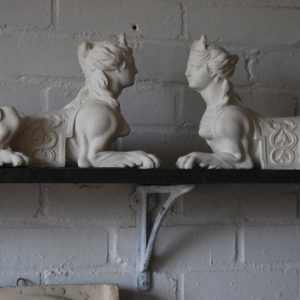No products in the basket.
Click and Collect – Please contact us to arrange collection or delivery of this item
An English cast plaster relief of the Madonna and Child,
Cast at LASSCO Three Pigeons from a 19th Century piece mould taken from the original marble relief of the Virgin and Child by the "Master of the Piccolomini Madonna" in the Chigi-Saraceni Collection, Siena,
the arched relief cast panel depicting the Virgin and Child, the Holy Mother seemingly sat before a parapet with her head inclined to the Infant as she cradles Him, the parapet ornamented with the arms of the Piccolomini flanked with swagged garlands and ribbon-tied lion-masks,
£200
In stock
The original marble relief of the Virgin and Child by the Master of the Piccolomini Madonna is held in the Chigi-Saraceni Collection, Siena. It is one of a series of nine reliefs repeating the same central motif which have for a long time been grouped around a single artist, "The Master of the Piccolomini Madonna". However, the V&A comments that seven of these reliefs differ so radically that they cannot be given to one artist. But for the Siena panel rendered in this cast, the attribution does seem justified, as with the version in the Louvre: they are identical in composition and appear to be by the same hand. They both bear the Piccolomini arms and have provenances linked with the Piccolomini family, as they came from the Palazzo Piccolomini (delle Papesse) in Siena and Pienza respectively.
The cast in the V&A collection is known to have been bought from Giuseppe di Ricco, a Siena based formatore in 1891, but no mention is made of the mould. LASSCO's mould - a shellac covered plaster piece-mould, evidently of 19th Century manufacture - could be di Ricco's, perhaps being supplied with the cast. Alternatively it could be a piece mould made in London from di Ricco's cast which was bought by the Museum for £2 18s 6d (20lire) in 1891. If the latter, the mould is almost certainly the work of Dominico Brucciani's workshop.


